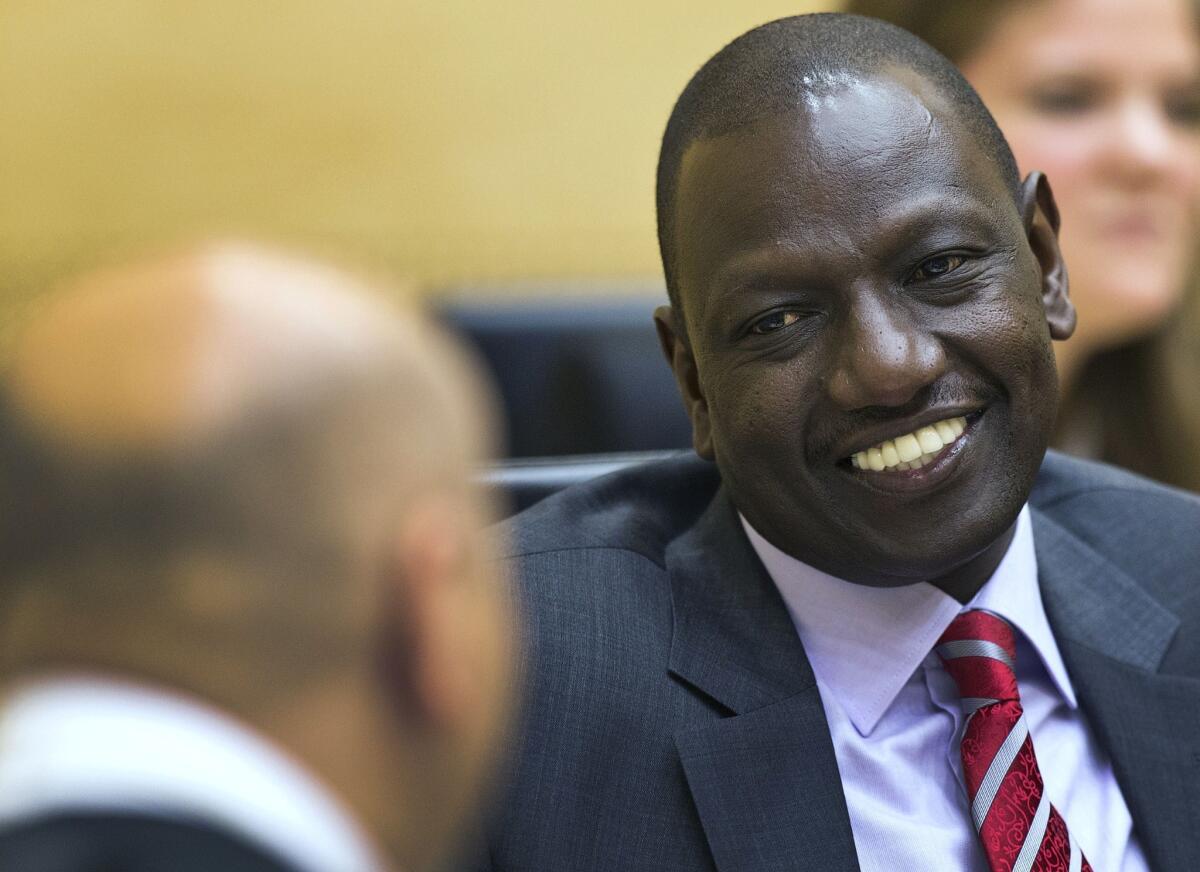International court accuses Kenyan journalist of witness tampering

- Share via
JOHANNESBURG, South Africa -- The International Criminal Court at the Hague unsealed a warrant Wednesday for the arrest of a Kenyan journalist accused of trying to bribe witnesses in the cases against the nation’s president and deputy president, charged with crimes against humanity.
The move follows accusations from the court’s chief prosecutor, Fatou Bensouda, of an unprecedented campaign by Kenyan officials to bribe or intimidate witnesses into withdrawing their cooperation with the prosecution against President Uhuru Kenyatta and his deputy, William Ruto.
Several key witnesses have recanted their evidence against Ruto. Kenyan media report that some of them have been spotted driving around in fancy cars, or have been given plots of land.
Judge Cuno Tarfusser found that the prosecutor had established there were reasonable grounds to believe journalist Walter Barasa was criminally responsible for bribing or attempting to bribe witnesses. But he is not believed to have acted alone.
“Allegedly, he has been and is still acting in furtherance of a criminal scheme devised by a circle of officials within the Kenyan administration,” the court said in a statement Wednesday.
The court called for Barasa’s arrest to ensure that he appears at trial. Barasa has denied any wrongdoing. His whereabouts was not immediately known.
Ruto and Kenyatta are charged with orchestrating violence against civilians during Kenya’s disputed 2007 elections. An estimated 1,500 people were killed in brutal ethnic violence across the country, particularly in the volatile Rift Valley.
Ruto’s trial began last month, and Kenyatta’s trial is due to begin in November.
The case is among the most politically contentious in the court’s 11-year history, with Kenyan officials mounting a strong, but so far unsuccessful, campaign for the charges to be dropped.
The recent deadly attack on a Nairobi shopping mall, claimed by the Somali terrorist group Shabab, has intensified pressure on the court to drop its insistence that Kenyatta and Ruto appear in person at their trials as has been required of other accused.
In a highly unusual decision, Ruto was excused from his trial in The Hague so he could return to Kenya to help deal with the crisis. Some analysts suggest that Kenyatta may also mount an argument that with the country at war with Shabab, he is needed at home.
Some witnesses who were allegedly offered bribes refused to recant their testimony, including the first witness to testify, whose identity has been suppressed by the court. The woman, known only as witness 536, was offered about $16,500 not to testify, according to local news reports. But she went ahead and gave evidence anyway.
The court issued the arrest warrant for Barasa on Aug. 2, but it was only unsealed Wednesday.
Some African leaders are pressing for a mass withdrawal from the 2002 Rome Statute, which set up the court, alleging the court is biased against the continent because its cases so far have all involved Africans.
ALSO:
American’s viral ‘I quit’ video hits home in Taiwan
Russia charges five Greenpeace activists with piracy
Myanmar villages burned in deadly religious violence
Twitter: @latimesdixon
More to Read
Sign up for Essential California
The most important California stories and recommendations in your inbox every morning.
You may occasionally receive promotional content from the Los Angeles Times.










